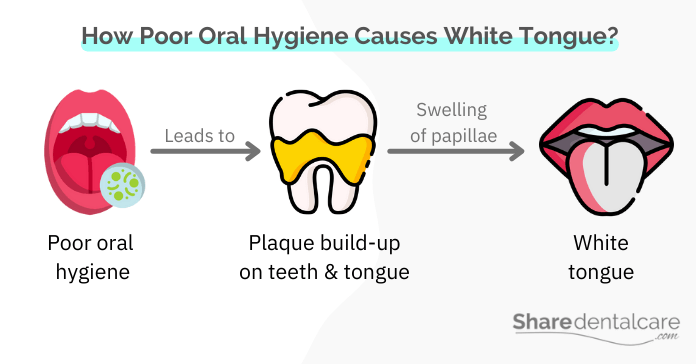Poor oral hygiene can cause a change in the color of the tongue from pink to white. However, other causes can develop white patches or lines on the tongue. White tongue can range from being harmless to serious, depending on various factors. Please see a doctor if you have any concerns about the color of your tongue. In this article, we will discuss various causes of the white tongue, as well as an effective treatment.
How Poor Oral Hygiene Leads to White Tongue?
To understand how poor oral hygiene causes white tongue, you should first know the anatomy of the tongue. The tongue is a muscular organ that has tiny bumps on its surface called papillae. These papillae aid in the sense of taste because taste buds are embedded inside these papillae.
Poor oral hygiene leads to the accumulation of plaque and food debris on the tongue surface, which causes swelling and overgrowth of the papillae. The normal color of the tongue is pink. White tongue is simply debris, bacteria, and dead cells getting trapped between the enlarged papillae of the tongue. In other words, if you have a white tongue, poor oral hygiene could be the cause. Also, the white tongue may occur for many other reasons than improper oral health.

White Tongue Due to Causes Other Than Poor Oral Hygiene
The white tongue doesn’t necessarily mean improper dental hygiene. Other causes of white tongue include:
- Not cleaning your tongue.
- Smoking or chewing tobacco. Also, you can get dark gums from smoking.
- Breathing through your mouth instead of the nose.
- Dry mouth condition.
- Dehydration.
- Excessive alcohol consumption.
- Eating a large number of soft foods
- Injuries to the tongue from sharp tooth edges or dental appliances.
- Fever.
- Viral, bacterial, or fungal infections.
- Some medications such as prolonged use of antibiotics.
Conditions Associated with White Tongue
The white tongue may occur as a symptom of some diseases and infections. Some diseases may cause white patches and lines on your tongue, including:
- Oral thrush: This is a common infection caused by the yeast Candida albicans, which usually affects people with a poor immune system.
- Leukoplakia: This is a white patch in the mouth that does not cause any pain. However, in rare cases, leukoplakia can turn into oral cancer.
- Oral lichen planus: this condition causes itchy and painful white patches in the mouth. It usually affects people who are more than 40 years old or those who take medications containing corticosteroids.
- Syphilis: this sexually transmitted disease can cause white patches on the tongue called syphilitic leukoplakia.
- Cancer: white patches in the mouth can be a sign of oral cancer, which may develop and spread to other organs. Therefore, if you have a white tongue with any other symptoms such as poor general health, fatigue, or weight loss, you should see a doctor immediately.
Treatment of White Tongue
The treatment of white tongue caused by poor oral hygiene is very simple. You have to improve your oral hygiene habits, and the white tongue will clear within a week or two. Here are some oral hygiene basics that you can follow:
- Brush your teeth twice daily with a soft-bristled toothbrush.
- Brush your tongue as well as teeth twice daily, using a toothbrush or tongue scraper.
- Floss your teeth at least once daily.
- Use a mouth rinse and/or an antiseptic mouthwash after you eat.
- Eat healthy food and drink plenty of water every day to keep your body well hydrated.
- Quit smoking, chewing tobacco, and drinking alcohol if you are doing so.
- Visit your dentist at least once every six months for regular check-ups and professional teeth cleaning.
In elderly people with no teeth, oral hygiene is important to prevent the white tongue and other health problems. If you find that your white tongue persists longer than 2 weeks or you have any of the following symptoms, you should go see a doctor:
- Pain or burning sensation in your tongue.
- Open mouth sores.
- Difficulty chewing, swallowing or talking.
- Poor general health.
- Fatigue.
- Weight loss.
White Tongue & Poor Oral Hygiene – Conclusion
Poor oral hygiene causes the enlargement of the papillae of the tongue, which traps debris and bacteria, causing white tongue. This condition can clear within 1-2 weeks by practicing good oral hygiene. There are many causes of the white tongue that go beyond improper oral hygiene. Conditions such as leukoplakia, oral thrush, and lichen planus can cause white patches on the surface of the tongue in addition to other symptoms. If you’re not sure what’s causing your white tongue you must see a doctor for an examination. Read more about the importance of teaching dental hygiene to preschoolers.